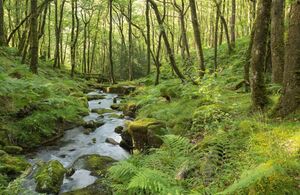Government response to Independent Review on Dartmoor published
The government has published its response to the Independent Review of Protected Site Management on Dartmoor.

The government has today (Wednesday 10 April) published its response to the Independent Review of Protected Site Management on Dartmoor.
The government’s response sets out a number of priorities to ensure farmers on Dartmoor are supported to produce food sustainably and run viable businesses while protecting important habitats and species across Dartmoor.
These include boosting farmers’ confidence in Environmental Land Management schemes, including those transitioning from Higher Level Stewardship (HLS) agreements; encouraging collaborative relationships between Natural England and commoners; and backing a robust strategy and long-term governance for Dartmoor.
It follows the Environment Secretary Steve Barclay meeting with commoners and wider stakeholders to discuss the long-term vision for the management of Dartmoor last month.
Environment Secretary Steve Barclay said:
I’ve heard firsthand the challenges faced by all those who live and work on Dartmoor, and our response sets out how we will ensure that farmers remain central to ensuring that we have healthy and varied habitats on Dartmoor which work in harmony with food production.
I’d like to thank David Fursdon and the panel for their work on this important review, and I hope that we can continue to work together to protect and enhance this breathtaking landscape.
A key recommendation in the Review is the creation of a Land Use Management Group (LUMG) to develop a multifunctional land use framework and long-term plan for Dartmoor.
Defra has today confirmed the LUMG will be set up later this year and run for two years. Defra will appoint an independent chair who will be supported by a secretariat provided by the Dartmoor National Park Authority (and funded by Defra) in the day-to-day running of the group.
Defra has also set out its ambition to make it easier for land managers to understand site designations and associated requirements, such as for those farming on Sites of Special Scientific Interest (SSSIs), and to make monitoring and evaluation of these sites more transparent.
As part of this, the response recognises the urgent need to reset in ways of working from all parties so that commoners receive advice and support to benefit from new opportunities under the Environmental Land Management schemes.
Marian Spain, Chief Executive of Natural England, said:
We welcome the review which sets out a clear and positive vision for the future of Dartmoor and will help bring together all of the people who have a role to play in making its unique wildlife, landscapes and farming sustainable.
Natural England has a statutory duty to protect sites containing the nation’s most precious examples of wildlife and biodiversity and we recognise that farming will remain integral to how we achieve this. Since the review’s publication, we’ve taken steps to rebuild trust with farmers and are advising our colleagues in Defra to make sure commoners are given the right support to run viable farm businesses that also work for Nature. We look forward to working with the Land Use Management Group to pull together a plan for the peat restoration, tree planting and sustainable grazing needed to restore nature, for everybody who cares about Dartmoor.
David Fursdon, Chair of the Review, said:
I am pleased to see the Government supporting many of the recommendations in our review. Those responsible for the future of Dartmoor and its special features need to come together now in an open and transparent way to discuss the practical steps necessary to restore and enhance this special place. This will require careful management, properly funded. This is their chance. They may not get another.
Since the Review’s publication, Defra has already taken steps to address many of the Review’s recommendations, including a new and improved moorland offer under the Sustainable Farming Incentive (SFI) scheme that addresses many of the grazing and vegetation management challenges raised in the Review.
Defra has also written to all Higher Level Stewardship (HLS) agreement holders to provide clarity and set out proposals for agreeing further annual extensions to HLS agreements into 2025.